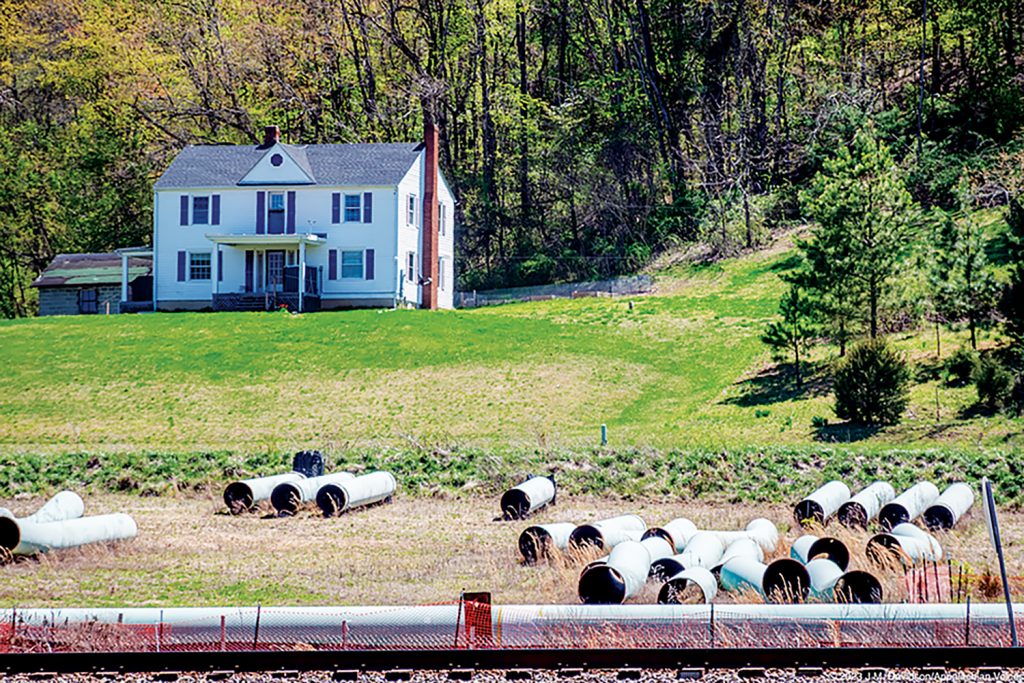Challenges Remain For Mountain Valley Pipeline

Mountain Valley Pipeline pipes litter the ground along the pipeline in front of a Virginia home. Photo by Jimmy Davidson
By Dan Radmacher
The last year has been an emotional rollercoaster for opponents of the Mountain Valley Pipeline. Sen. Joe Manchin struck a deal with President Joe Biden and Senate Majority Leader Chuck Schumer during summer 2022 to vote for the Inflation Reduction Act in exchange for a promise to pass a bill to attempt to force approval of the pipeline. Since then, opponents have witnessed a number of victories and setbacks.
Opponents of the pipeline defeated multiple attempts to attach Manchin’s proposal to must-pass legislation like budget and defense bills last fall and winter. In late March and early April, the 4th U.S. Circuit Court of Appeals delivered split decisions in cases involving water quality certifications in Virginia and West Virginia, upholding Virginia’s while rejecting West Virginia’s.
Shortly after that, the U.S. Fish & Wildlife Service issued a new opinion approving MVP’s compliance with the Endangered Species Act. Environmental groups including Appalachian Voices, the publisher of this newspaper, quickly challenged that decision in court.
About a month later, the U.S. Forest Service revised its Jefferson National Forest plan to authorize construction of MVP across the protected land in West Virginia and Virginia, and the Bureau of Land Management approved the right-of-way. Opponents also challenged that decision in court.
Then, with a debt default by the United States looming, Manchin’s MVP provision was included in the Fiscal Responsibility Act, the bill to suspend the debt ceiling. Despite furious opposition and proposed amendments supported by much of Virginia’s congressional delegation to strike the MVP provision, the measure remained in the bill signed by Biden on June 3.
The MVP portion of the law directed federal agencies to issue any outstanding authorizations for MVP within 21 days, attempted to strip courts of jurisdiction over the legality of the permits, and said only the D.C. Circuit Court of Appeals could hear challenges to the bill itself.
In late June, the Federal Energy Regulatory Commission issued an order authorizing construction to resume along the entire pipeline route.
But environmental groups objected to motions filed by MVP asking the court to dismiss the pending challenges to the Endangered Species Act opinion and the U.S. Forest Service and BLM authorizations, arguing that Congress had violated separation of powers principles of the U.S. Constitution and requesting stays preventing construction while those issues were being decided.
In July, the 4th Circuit granted both stay requests. MVP filed an emergency appeal with the U.S. Supreme Court shortly thereafter, and Chief Justice John Roberts asked environmental groups, including Appalachian Voices, to respond to MVP’s appeal. The Supreme Court ruled in favor of the pipeline on July 27 and vacated the stays prohibiting construction. Also on July 27, the 4th Circuit heard oral arguments on whether to dismiss pipeline opponents’ pending challenges to MVP’s Forest Service and BLM authorizations and Endangered Species Act opinion. The court had not issued a decision as of August 4.
MVP Southgate, the proposed extension of the mainline pipeline into North Carolina, was not included in the Fiscal Responsibility Act. In June, MVP filed for a three-year extension of its original certificate from FERC for its MVP Southgate Extension, despite being denied state permits previously in Virginia and North Carolina. During the public comment period on MVP’s request for more time to build Southgate, more than 38,000 individuals and organizations expressed opposition, including more than 50 North Carolina legislators and 22 Virginia legislators, as well as North Carolina Gov. Roy Cooper and two U.S. representatives from North Carolina.
Related Articles
Latest News
More Stories

Leave a comment
Your email address will not be published. Required fields are marked *





Leave a Comment